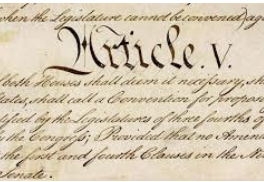Last week I listened to a candidate who stated: “I believe in our Constitution and in the wisdom of our founding fathers.”
A few days later I noticed a bumper sticker that said: “I support the Constitution.”
This is anecdotal evidence, but it seems that the constitution is getting a lot of love lately.
The constitution they love codifies the core values of the people of the United States. It establishes our framework of national government and what rights are immutable in the realization of freedom.
Personally, I think the seven articles that detail the components of government are genius. The founding fathers conspired to create a brilliant plan with three branches to maintain balance and where the ultimate authority is in the hands of the electorate.
Yet, the authors, the Constitution, the Bill of Rights, and the Amendments that followed are all products of their specific time. How else can we comprehend the fact that many of the Founding Fathers, authoring a document of inalienable freedom, held slaves?
How else can we reconcile that African Americans were not recognized as citizens for a hundred more years? Or that women, regardless of race, could not participate in our election process for nearly 150 years after the Constitution was ratified?
A context paradox extends to Amendments themselves. The 3rd Amendment, for example, forbids the forcible housing of military personnel in a citizen’s home during peacetime. Not much relevance today, but in the late 18th century British soldiers demanded food and shelter in civilian homes and businesses.
The 3rd Amendment was relevant to its time. As was the 2nd Amendment when, as the prefatory clause stated, a militia was necessary to the security of a free state.
Does a new context mean those Amendments should be discarded?
Not necessarily. They remain precedents that can serve to clarify foundational intentions regarding the reach of government.
The Framers, in their wisdom, included Article V precisely because they realized that the Constitution, if it was to remain relevant to a constantly changing and evolving society, had to have a mechanism by which to adapt. Otherwise, their document to codify core values, written by white, male, landowners, would only protect the inalienable rights of white, male, landowners.
I’ve been writing articles long enough to know that someone will inevitably say: “Kroeger wants to throw out the Constitution!”
Let me be very clear: Our democracy survives only by our agreement to abide by the Constitution. I, too, support the Constitution and I believe in the process our Founders constructed to make it live. I believe in its Preamble to “secure the Blessings of Liberty to ourselves and our Posterity.”
“Posterity” means that the Constitution must remain relevant to its time and, therefore, can never be complete.
And I love that.
